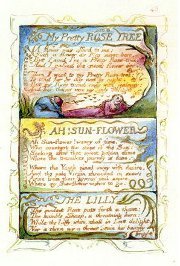Songs of Innocence and Experience Contents
- Social / political context
- Religious / philosophical context
- Literary context
- Textual history
- Songs of Innocence
- Introduction (I)
- The Shepherd
- The Ecchoing Green
- The Lamb
- The little black boy
- The Blossom
- The chimney sweeper (I)
- The little boy lost (I)
- The Little Boy Found
- Laughing song
- A Cradle Song
- The Divine Image
- Holy Thursday (I)
- Night
- Spring
- Nurse's Song (I)
- Infant Joy
- A Dream
- On Another's Sorrow
- Songs of Experience
- Introduction (E)
- Earth's Answer
- The Clod and the Pebble
- Holy Thursday (E)
- The Little Girl Lost
- The Little Girl Found
- The Chimney Sweeper (E)
- Nurse's Song (E)
- The Sick Rose
- The Fly
- The Angel
- The Tyger
- My Pretty Rose-tree
- Ah! Sun-flower
- The Lilly
- The Garden of Love
- The Little Vagabond
- London
- The Human Abstract
- Infant Sorrow
- A Poison Tree
- A Little Boy Lost (E)
- A Little Girl Lost
- To Tirzah
- The Schoolboy
- The Voice of the Ancient Bard
- A Divine Image
Ah! Sunflower - Synopsis and commentary
Synopsis of Ah! Sunflower

The speaker addresses a sun-flower who follows the progress of the sun. It seems to the speaker that the flower aspires to eternity when there is no more sunrise and sunset. This is the place where the youth and the virgin, who never fulfilled their earthly desires, hope to go after their resurrection.
Commentary
The melancholy sunflower seeks freedom from its bondage to the earth / passing time, in which it is literally rooted. The ‘golden clime' it aspires to may represent its ultimate union with the sun that its name reflects, or the light of heaven. According to conventional church teaching, heaven is the destination of Christian believers beyond the grave. So the sunflower may be wishing for death, which has already occurred for the youth and maiden.
This poem can also be seen as Blake's response to the familiar Christian approach to the transience of mortal life. In this tradition, the flower's transience is a reminder to the believer to value the [3eternal life to come, rather than passing pleasures. However, Blake reverses this. In his view, the ‘prize' of eternal life requires a present existence which is life-denying. In Ah! Sunflower this is seen in the denial of the young man who never acts on desire, the virgin who is sexually frozen. It is such as these who lose the joy of present life and experience, for the sake of aspiring after a future devoid of life.
Investigating Ah! Sunflower
- Do you read the poem as being essentially positive or negative about life beyond death?
